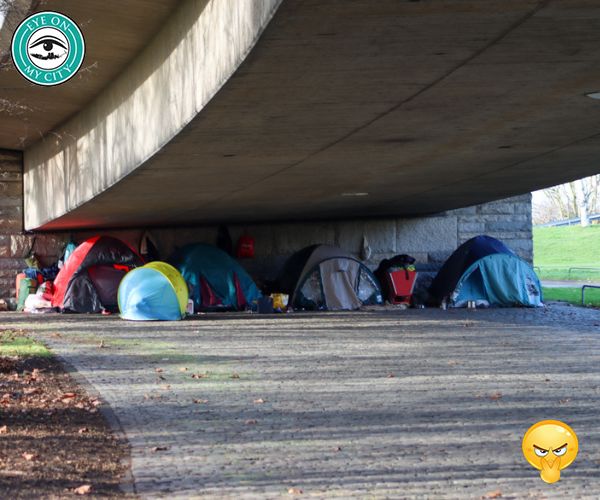For eight years I worked out of state, so my visits to Jacksonville were limited to short stints. During that time, changes in road construction, neighborhoods, and politics took place. One major change that will forever burn in my brain is a side trip that took me through the downtown area.
I was taken aback by rows of tents and makeshift shelters spread over several blocks not far from where I worked for many years. Immediate calls to family and friends gave me some insight into what they referred to as “tent city.”
Now that I am back in town permanently and working with Eye on Jacksonville, I am learning much about the plight of the homeless in the area, and while tent city no longer exists huge issues with homelessness still abound in our city.
Recently, Eye got a tip from an unnamed source, close to the sheriff’s department, that van loads of homeless individuals were being bused into Jacksonville. It is unknown if these individuals were brought in from other cities or if they are local citizens who have hit upon hard times. The real clencher is that this source also stated that some of these individuals were being dropped off and left to fend for themselves.
An in-depth report by the Guardian confirmed that many cities are dolling out one-way bus tickets to homeless people taking then to other states and cities without any long-term support, leaving many in new locations without connections to people or agencies that can offer help.
Additional information from the Guardian reveals that relocating the homeless to other cities is not new. https://www.theguardian.com/us-news/ng-interactive/2017/dec/20/bussed-out-america-moves-homeless-people-country-study
Apparently, cities have been offering homeless people free bus tickets to relocate elsewhere for the past 30 years; however, in recent years homeless relocation programs have become more common, costing the public millions of dollars. Further evidence indicates that many of those receiving one-way tickets ended up back in the original cities that they had left, still struggling with homelessness.
A response given by ChatGPT also indicated that some homeless people are being relocated to cities without support. The AI bot said, “Yes, some homeless individuals are being relocated to other cities without family support. While programs like “Homeward Bound” and others are often framed as ways to reunite people with family or support networks, in reality, not all those relocated have such connections. Some are sent to cities where they have no established support system or resources available.”
But is this happening in Jacksonville?
The Jacksonville Sheriff’s Office (JSO) that oversees the assistance-based Homeless Bound program, in collaboration with Downtown Vision, Inc. says the program’s goal is to help homeless people relocate to a stable, permanent housing situation and return to their original communities so they can receive the support and treatment they need from people who know them. (Jacksonvilleonestop.org; Homeward Bound Program)
JSO public information officer Christian Hancock told Eye JSO is aware of an instance of several individuals from another state being brought to the downtown area of Jacksonville and dropped off. However, Hancock said, “This was not something we can confirm that has happened on multiple occasions, and they were not dropped off at, or to, the Jacksonville Sheriff’s Office.”
Handcock added that the program offers those in need a bus pass to any location they request provided the particular location would get them to a family member offering support or other assistance.
“The Jacksonville Sheriff’s office vets those in need and requesting this service through this program to ensure there is help in the location being requested to move,” Handcock said. “The JSO would not be able to advise the motivation for these individuals coming to or being brought into our area. However, the City of Jacksonville, along with other private/public partners offer various avenues of support for those in need in our homeless communities.”
Trying to understand the reporting of the numbers of homeless in Jacksonville, and whether those brought in from other cities are counted part of those overall numbers, can be a bit perplexing.
First, the number of homeless accounted for are broken down into two categories, sheltered and unsheltered. Unsheltered refers to a person living a place not meant for human habitation such as an abandoned building, a car, on a sidewalk, or in a park. Sheltered refers to someone in an unstable or non-permanent situation who may be living in a temporary shelter or has been released from prison or a hospital. Those taking turns residing on someone’s couch, known as couch surfers, are also considered part of the homeless population.
Additionally, the breakout for numbers of homeless in Jacksonville are many times lumped into Jacksonville and surrounding areas. Numbers released through Changing Homelessness, an agency that works to prevent homeless in Clay, Duval, and Nassau counties estimates there are roughly 567 unsheltered people in Jacksonville. This 2024 approximation was determined by the annual Point-in-Time (PIT) count, a survey conducted by the agency that estimates the number of people experiencing homelessness in a community on a single night. According to the agency, the PIT Count is an essential element in the effort to end homelessness.
“The data gathered from this census shows much more than how many people are homeless — we also learn more about who is homeless and why,” according to the nonprofit’s web site.” The PIT presents a great opportunity to raise awareness of the myriad challenges our neighbors experiencing homelessness face through personal experiences and demonstrate the compassion and generosity of our community.”
The PIT Count also helps organizations understand the scope of homelessness in their communities and develop strategies to help. The count can provide information on the following:
- How many people became homeless for the first time
- How many people returned to homelessness
- How many people exited homelessness
- Whether the experiences of people moving through the system are equitable
According to the PIT count, the number of people experiencing homelessness in Jacksonville has decreased overall by 55% since 2013. The number of unsheltered people has decreased by 69% over the same period. However, the unsheltered population in Northeast Florida increased by 43% from 2023 to 2024.
Other organizations and reporting agencies that work with the homeless showed different numbers. An article in Circles, a social datebook and charity register (https://circlescharityregister.com/uncategorized/help-hope-the-current-crisis-of-homelessness-in-northeast-florida/), lists the number of people experiencing homelessness throughout Duval, Clay, and Nassau counties at 3,400, with only about 1,100 emergency shelter beds available in the Jacksonville area.
In a story published by Eye, Lindsey Roberts cited another two categories accounting for numbers of homeless in the area – chronically homeless and unhoused population.
Roberts wrote that during one of City Council’s special committee meetings an official with the nonprofit Ability Housing presented a document claiming that in 2019 301 people in Duval County were considered “chronically homeless. By 2024, that number was down to 121. The agency lists Duval’s 2024 unhoused population as 1,209, bumping the city’s homeless population total to 1,330.



One response to “Homeless have been bused into Jacksonville”
I was told that there was some cities north of Jacksonville that were giving some homeless folks a one-way ticket here to Jacksonville and this was about over 10 years ago. There’s no way Jacksonville to redevelop downtown and make it a desirable place to live until they are able to get rid of the homeless especially all the encampments along State and Union Streets.